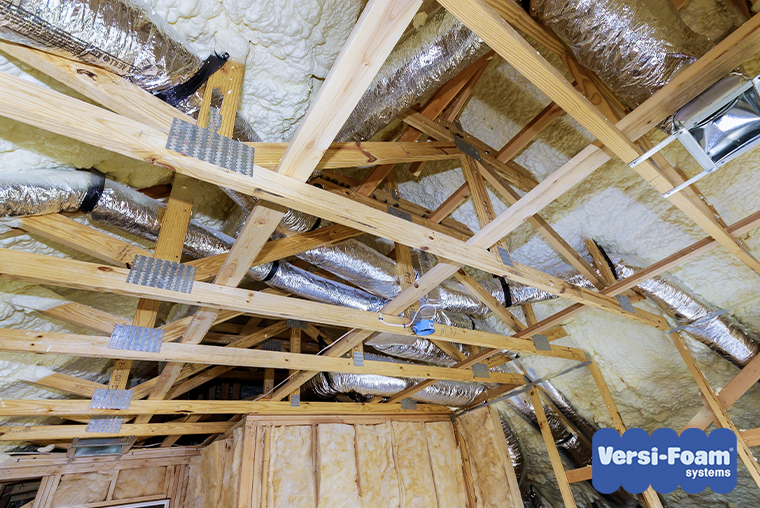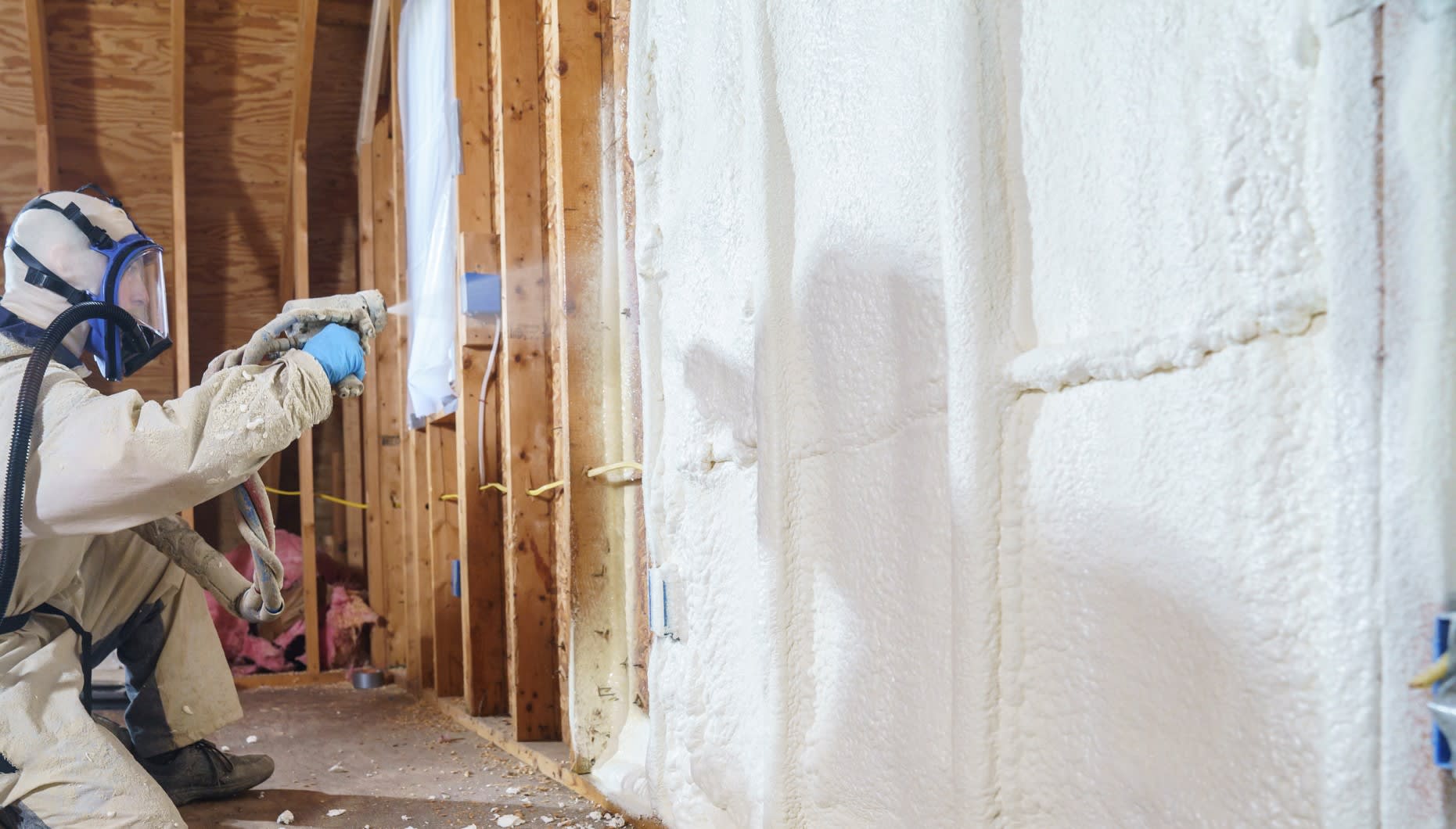Typical Myths Concerning Spray Foam: Debunking the Misconceptions
Typical Myths Concerning Spray Foam: Debunking the Misconceptions
Blog Article
Spray Foam: The Ultimate Service for Air Sealing and Insulation
Spray foam insulation has actually become a leading remedy for efficient air sealing and thermal insulation, using a special combination of properties that establish it apart from traditional techniques. Its capability to broaden and fill up spaces makes it particularly effective in avoiding air leakage, which can considerably affect power effectiveness. Understanding the full scope of its benefits, installation procedures, and contrasts with various other insulation types is important for making informed choices. As we explore these facets, the implications for both new buildings and retrofits become progressively significant. What factors should influence your selection?
What Is Spray Foam?
Spray foam is a versatile insulation product that incorporates the principles of air securing and thermal resistance to enhance power performance in structures. Composed mainly of polyurethane or other comparable compounds, spray foam is applied as a fluid that broadens upon contact with surfaces, creating a solid, constant layer of insulation. This one-of-a-kind residential or commercial property permits it to load spaces, splits, and voids that traditional insulation materials may forget, giving an exceptional air seal.
There are 2 main sorts of spray foam: open-cell and closed-cell. Open-cell spray foam is lighter and a lot more flexible, offering outstanding sound absorption and a reduced R-value per inch - Spray Foam. In contrast, closed-cell spray foam is denser, offering a greater R-value, wetness resistance, and included architectural stability to constructing parts
The application procedure typically includes specific equipment, ensuring a smooth application that complies with various substratums, consisting of metal, timber, and concrete. This adaptability makes spray foam ideal for both new building and constructions and retrofitting existing frameworks. Its capability to produce an impermeable barrier dramatically adds to lowering energy usage and boosting indoor air top quality, consequently making it a preferred option amongst property owners and building contractors alike.
Advantages of Spray Foam Insulation
Among one of the most considerable benefits of spray foam insulation is its extraordinary capability to develop a continuous air barrier, which properly decreases power loss. Unlike traditional insulation materials, spray foam broadens to fill up cracks and voids, ensuring that air leakage is dramatically minimized. This characteristic not only improves energy effectiveness but additionally results in reduce utility bills gradually.
Additionally, spray foam insulation offers exceptional thermal resistance, adding to an extra stable interior setting. Its high R-value per inch permits effective insulation in constrained spaces, making it perfect for attics, wall surfaces, and crawl areas. Moreover, the moisture-resistant residential properties of spray foam help stop mold and mildew and mildew growth, promoting healthier living problems.
One more important benefit of spray foam insulation is its sound-dampening top qualities (Spray Foam). It efficiently decreases sound transmission in between spaces, developing a quieter and extra comfy home environment. The sturdiness of spray foam also stands out, as it does not sag or resolve in time, maintaining its efficiency throughout its life-span
Exactly How Spray Foam Works
Understanding just how spray foam insulation functions is vital for appreciating its efficiency in air securing and thermal resistance. Spray foam insulation is composed of 2 primary parts: isocyanate and polyol material. When these elements are combined, they undergo a chemical response that triggers the product to broaden rapidly, producing a thick foam that fills up voids, tooth cavities, and splits.
As the foam broadens, it complies with surfaces, creating a closed seal that substantially lowers air seepage. This characteristic makes spray foam insulation extremely reliable at preventing drafts and dampness infiltration, which can bring about power loss he said and damages gradually. Furthermore, the closed-cell variation of spray foam uses exceptional thermal resistance because of its inflexible framework, properly lessening warmth transfer.
The distinct buildings of spray foam allow it to adapt irregular surfaces, making sure thorough insurance coverage and a smooth barrier. Because of this, spray foam insulation not only enhances power effectiveness yet additionally adds to boosted interior air top quality by minimizing the buildup of pollutants and irritants. Ultimately, understanding the technicians behind spray foam underscores its role as a remarkable choice for insulation and air sealing in both property and commercial applications.
Installation Process Introduction

Before installment, the space should be properly cleaned up and prepped, ensuring that surface areas are without dampness, dirt, and debris. Due to the fact that impurities can jeopardize attachment and total efficiency, this action is essential. When the area is prepared, the application includes mixing the 2 components of the spray foam, which expands upon contact and loads voids effectively.
Trained specialists ought to carry out the setup, utilizing specialized devices to guarantee uniform insurance coverage and optimum density. Safety and security safety measures, including putting on protective gear and ensuring appropriate ventilation, are critical throughout this process. After application, the foam normally remedies swiftly, creating a solid barrier that enhances power effectiveness.
Contrasting Spray Foam to Typical Insulation
When reviewing insulation alternatives, spray foam insulation stands out in comparison to traditional products such as fiberglass and cellulose. Unlike fiberglass and cellulose, which can allow air infiltration, spray foam expands upon application, filling up holes and spaces to develop an airtight seal.
Furthermore, spray foam gives a higher R-value per inch than typical insulation kinds, providing more efficient thermal resistance in a thinner profile. This particular is special info particularly beneficial in spaces with minimal tooth cavity deepness. Moreover, spray foam is immune to wetness and mold development, which can be a substantial worry about cellulose and fiberglass, particularly in humid settings.
However, spray foam insulation generally lugs a higher in advance price than its typical equivalents. Homeowners need to consider this initial investment against long-lasting energy cost savings and efficiency advantages. Ultimately, while both insulation kinds serve their purpose, spray foam becomes an advanced service for modern insulation needs, specifically in regards to air securing and thermal effectiveness.

Verdict
In recap, spray foam insulation represents a highly effective solution for attaining optimum air sealing and thermal resistance. Its special properties, consisting of dampness resistance and audio dampening, make it suitable for numerous applications in both new buildings and retrofitting jobs (Spray Foam). The preliminary prices might be greater compared to standard insulation products, the long-term advantages, such as significant power financial savings and improved interior air quality, warrant the financial investment and emphasize its value in modern structure methods.
Spray foam insulation has arised as a leading option for efficient air securing and thermal insulation, supplying an one-of-a-kind combination of homes that establish it apart from traditional approaches.Spray foam is a flexible insulation material that incorporates the principles of air sealing and thermal resistance to enhance power effectiveness in structures.When assessing insulation choices, spray foam insulation stands out in comparison to traditional products such as fiberglass and cellulose. Eventually, while both insulation kinds offer their objective, spray foam arises as a more sophisticated service for contemporary insulation requirements, specifically in terms of air securing and thermal performance.
In recap, spray foam insulation represents a highly effective solution for accomplishing ideal air securing and thermal resistance.
Report this page